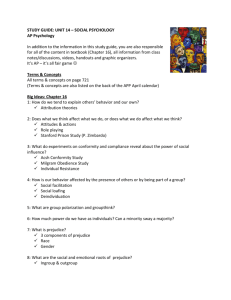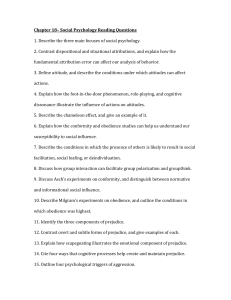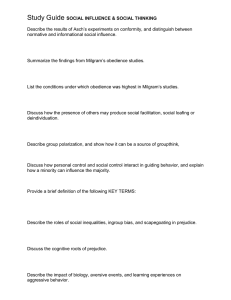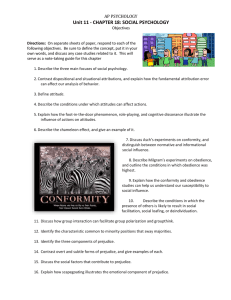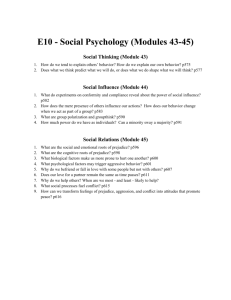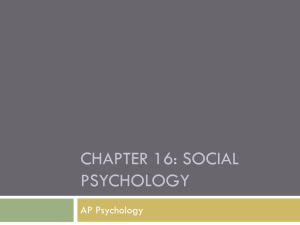File
advertisement
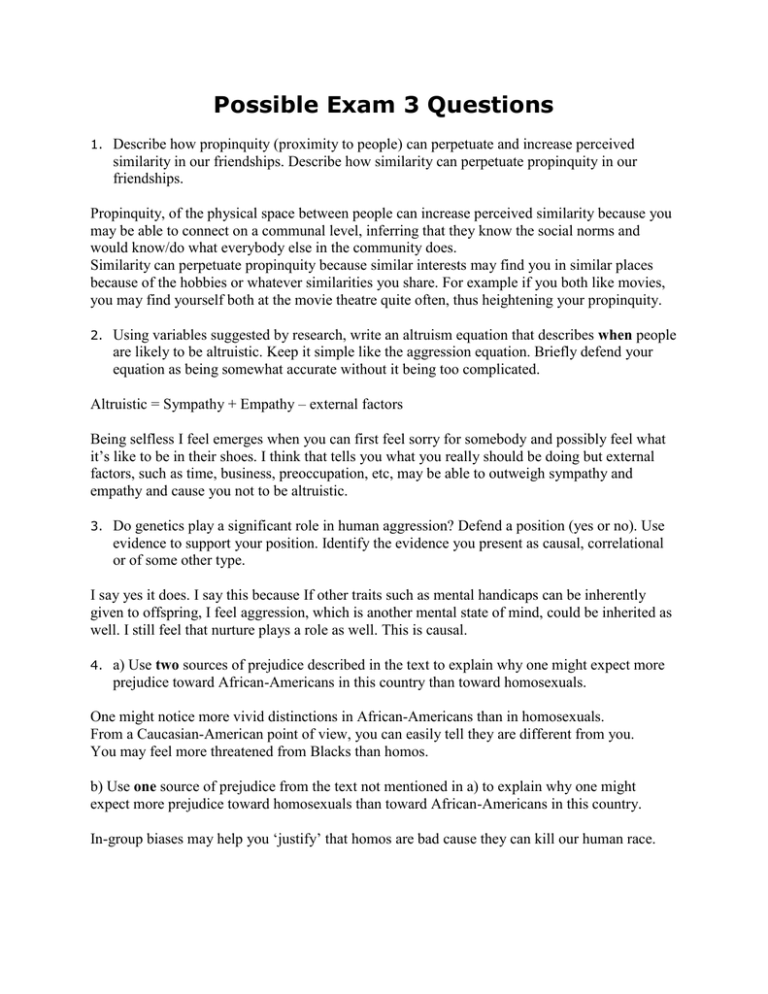
Possible Exam 3 Questions 1. Describe how propinquity (proximity to people) can perpetuate and increase perceived similarity in our friendships. Describe how similarity can perpetuate propinquity in our friendships. Propinquity, of the physical space between people can increase perceived similarity because you may be able to connect on a communal level, inferring that they know the social norms and would know/do what everybody else in the community does. Similarity can perpetuate propinquity because similar interests may find you in similar places because of the hobbies or whatever similarities you share. For example if you both like movies, you may find yourself both at the movie theatre quite often, thus heightening your propinquity. 2. Using variables suggested by research, write an altruism equation that describes when people are likely to be altruistic. Keep it simple like the aggression equation. Briefly defend your equation as being somewhat accurate without it being too complicated. Altruistic = Sympathy + Empathy – external factors Being selfless I feel emerges when you can first feel sorry for somebody and possibly feel what it’s like to be in their shoes. I think that tells you what you really should be doing but external factors, such as time, business, preoccupation, etc, may be able to outweigh sympathy and empathy and cause you not to be altruistic. 3. Do genetics play a significant role in human aggression? Defend a position (yes or no). Use evidence to support your position. Identify the evidence you present as causal, correlational or of some other type. I say yes it does. I say this because If other traits such as mental handicaps can be inherently given to offspring, I feel aggression, which is another mental state of mind, could be inherited as well. I still feel that nurture plays a role as well. This is causal. 4. a) Use two sources of prejudice described in the text to explain why one might expect more prejudice toward African-Americans in this country than toward homosexuals. One might notice more vivid distinctions in African-Americans than in homosexuals. From a Caucasian-American point of view, you can easily tell they are different from you. You may feel more threatened from Blacks than homos. b) Use one source of prejudice from the text not mentioned in a) to explain why one might expect more prejudice toward homosexuals than toward African-Americans in this country. In-group biases may help you ‘justify’ that homos are bad cause they can kill our human race. 5. Ch. 11 discusses five factors that research suggests help initiate friendships. Some of those factors appear to be more consistent with an "attitude causes behavior" perspective and some of the factors appear to be more consistent with a "behavior determines attitudes" perspective. Choose one of the five factors and explain how it could be interpreted as more consistent with attitudes cause behaviors. Choose another factor and explain how it could be interpreted as more consistent with behaviors lead to attitudes. 6. A friend of yours asks, "Hey, did you learn anything in that Social Psychology course you took?" What would be one significant lesson that you have learned about human social behavior from this course you can tell your friend about? Use at least three course concepts to support your point. A lot of the mental processes we do, we actually do unconsciously. For instance, some stereotypes. The example my teacher used was your saw two big black guys walking down the street and you are with your gf. Naturally she just holds on tighter to you and more often than not she won’t even notice she did it. De-individuation in groups. Etc. 7. Do genetics play a significant role in human attraction? Defend a position (yes or no). Use evidence to support your position. Identify the evidence you present as causal, correlational or of some other type. I would say yes, obviously propinquity in not genetic, but similarities and physical attractiveness are. When you look at somebody, every feature they have is from their genetics (aside from surgeries). 8. Choose a specific prejudice other than one discussed in class (e.g., don't choose racism or prejudice towards homosexuals). Explain how three of the factors mentioned in class or the text that initiate prejudice do or do not apply to the form of prejudice you chose. Women are bad drivers. Threat – If they are bad or reckless drivers they make that realistic danger whenever somebody get on the road. In-Group Bias – Since us men are amazing drivers, whenever we see a female driver driving bad we call them out on it. Although, if she is driving well, we most likely would just ignore her, simply because she does not help support our claim that women are bad drivers. Different – It will be obvious to tell if it’s a women or not and since they are different than us men, we just say they are different. 9. There are more social motives than the three we discussed at the beginning of the term. Name a different social motive that you believe is quite important in understanding social interaction. Use three different concepts, each from a different chapter/topic, to illustrate why you believe this "new" motive is important. Belonging – I feel that belonging is a huge part of our society that many people take for granted. We can link this all the way back to Erik Erikson’s first stage, where the crisis was trust vs. mistrust. Developing that trust would be the number one influence on how you think you belong. I think attitude and behavior have a lot to do with this. If you have undesirable assets like a shitty attitude which leads to devious behavior, nobody would want you in the group, thus making you not belong. 10. How is deindividuation’s effect on social loafing similar to its effect on aggression? With social loafing, deindividuation makes you lose your identity and social awareness. You also stated that: Loss of social awareness = Lowered inhibitions. Well your model of aggression was: Aggression = Arousal – Inhibitions. Deindividuation, I feel lowers your inhibitions which could easily boost up your aggression levels. Its effect on social loafing 11. a) Choose two of the factors discussed in class that often maintain one group's prejudice towards another group. Explain how one of those two factors can enhance or increase the impact of the other factor. Media and confirmation bias. b) Choose a third factor discussed in class that maintains group prejudice. Select any strategy or concept discussed this term that is involved in influencing behavior or reducing conflict. Explain how that strategy could be used to diminish the impact of the factor you identified that maintains prejudice. Family; Exposure to outgroups. 12. Name three concepts (each coming from a different chapter) discussed this term that support the statement, "It is our perception of reality, not reality itself, that influences our behavior." Briefly explain how each of the three concepts supports the statement. Unrealistic Optimism – Where you overestimate the outcome and are overly optimistic. Normally you wouldn’t drink and drive, but with unrealistic optimism you feel that you’ll fine if you drink and drive. Stereotypes – If you stereotype that one race is bad at a sport, and a group of that race challenges you for money, your most likely going to say yes. They look like average guys but they kick your butt because you didn’t know they were professionals at that sport. So your perception led you to accept that challenge instead of turning it down because they are professionals. Overconfident – You discount everything going against your judgment. Favor the things that support it. 13. Researchers hypothesized that increasing a woman's level of arousal would increase her perceptions of attractiveness of members of the opposite sex. To test this, eighty females were randomly selected to participate in a study. First, participants were asked to ride an exercise bike for as long as they could at a predetermined high rate of speed. Then, after a brief rest period, participants were asked to rate the physical attractiveness of a series of pictures of males. Researchers found that the longer the participants rode the bike the more attractive they rated the males in the pictures. a) Did the researchers select an appropriate methodology given the stated hypothesis? Yes or No? Yes b) If you answered Yes, explain why the methodology was appropriate for the hypothesis. If you answered No, explain why the methodology was inappropriate for the hypothesis. Arousal is just reacting to stimuli. Their hypothesis was supported because the perception of attractiveness was raised because what they found attractive also changed. After this intense period, their standard for what is attractive lowered. Questions 14-17 refer to the following situation. You were at work quite late last night organizing some important files. You left the files stacked on your desk for a subordinate to pick up in the morning to deliver right away to an important meeting. When you arrive in the morning you see the subordinate is "picking up" the files, but not as you had intended. The subordinate dropped the files! All your hard work lies in disarray on the floor. The subordinate is hurrying to pick them up and is apologizing profusely. Your thoughts are fleeting between altruism and aggression! To determine which you might choose, answer the following questions: 14. Choose two aversive incidents described in the text that increase aggressive behavior. Explain how those two incidents could very possibly be present in the above description (even though they are not mentioned), and explain how the two incidents could increase your likelihood of being aggressive in the above situation. 15. On the other hand, you might choose to help pick up the papers. Identify three variables given in the above description that research says could increase or decrease your helping behavior. Briefly explain how each might affect your likelihood of helping. 16. Add to the above description to increase the likelihood that you would help. Specifically, change the above description to include three other conditions (beyond those mentioned in Question 16) that research has found would usually increase your helping behavior. 17. Use two of the three theories presented in class on why people sometimes refuse or don't want help to explain why the subordinate might reject your offer of help in the above situation.
